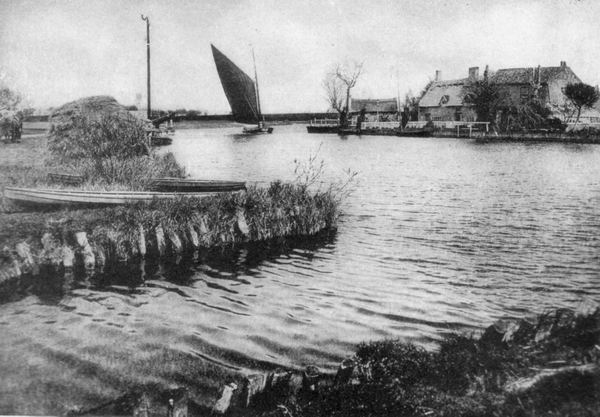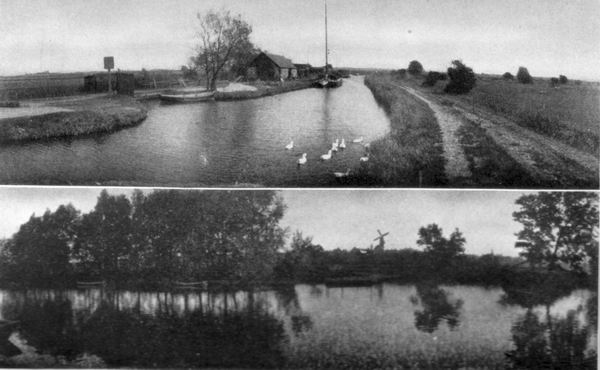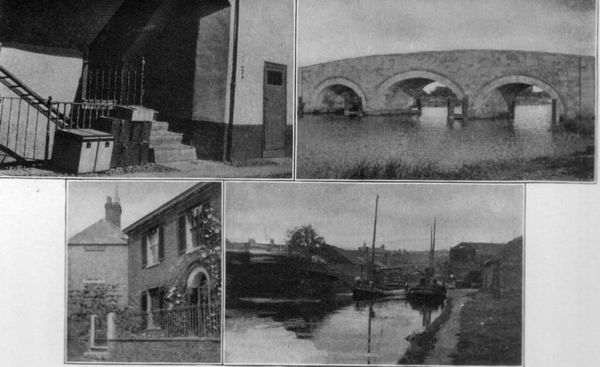|
CHAPTER X
ANGEL INN
Acle Bridge
"WITHOUT a sail on the Broads, I refuse
to leave Norfolk," declared the Matron, as we sat at dinner the night
of our return from Thetford. " It would be rather hard to answer the
questions our numerous friends will ask when they hear we have been in
Norfolk."
"I know lots of people at home who think
there is nothing to see in Norfolk but Sandringham and the Broads,"
continued the Invalid.
"And are not quite sure about
Sandringham, either," finished Polly. " I don't see how we are going to
manage it," said Polly.

On the Norfolk Broads.
"Go ask the hotel manager, that is the
wisest way, and we will decide ourselves when we hear what he tells
you."
So Polly left us to go into the pretty
Jacobean office, which looks for all the world like a monstrous piece
of oak furniture, and we went on to warm ourselves before the great
thirteenth-century fireplace in the reading-room. What a comfortable,
great room it was! with writing-tables and tables covered with current
literature. Our good luck inspired a gentleman sitting next us to talk
to his wife of a cruise they were preparing to take on the Broads. He
had been that day to engage a large wherry at Thorpe just beyond the
railroad station, and the couple were preparing to live on the boat for
two weeks. From his conversation we inferred that he had evidently
rented a large boat capable of accommodating five or six people, for
which he was to pay a pound a day. A man and a lad constituted the
crew. How we wished we could exchange our coming ocean voyage and the
big rocking steamer for such a quiet cruise and such a roomy wherry!
The gentleman went off to complete his plans. He was not well out of
the room, however, before the Invalid was deep in conversation with his
lady, and asking questions in her most enchanting manner. Who would not
tell the Invalid all she wants to know when she cocks her pretty head
on one side and looks so deeply interested? She entices knowledge from
every one she meets.
Polly returned while the Invalid was
imbibing knowledge, and our scheme for the morrow was satisfactorily
arranged before the questioner rejoined us, bursting with information.
"They will take only a few tinned
delicacies," she began, but never finished; we were too full of our own
projects to listen to what others intended doing.
"We are in great luck," began Polly.
"The manager referred me to the lady-manager, who, when she heard what
we wanted, at once said that there happened to be two young men
stopping in the hotel who had a large wherry at Wroxham Bridge which
they wanted sailed down to Yarmouth. She had heard them talking about
it to-day. They would let us hire it, she was sure, because they did
not wish to rejoin the boat until sometime at the end of the week. If
the wind is right, she says we can make the necessary twenty-six miles
in a day. Even if there is not a spanking breeze, it will be possible
to see one or two of the Broads, and come back by rail from Salhouse or
Acle. The manageress then went off to fetch one of the young men, and
came back instead with their decision. We can have the boat to-morrow
morning if we are each willing to pay them three dollars apiece for the
day's pleasure; that sum will include luncheon, which we can take from
here."
"Oh, why not stop at a riverside inn,"
exclaimed the Matron.
"We won't have much time for stopping
unless the wind blows a gale or doesn't blow at all," answered Polly.
So we decided to take the wherry and see
what we could.
We woke early on the eventful day to
find the weather all we desired. Our plan of action included a very
early breakfast and an early train to Wroxham Bridge, where we were to
join "our ship," as Polly insisted upon calling it.
"Come early and avoid confusion," was
the somewhat banal quotation the Invalid made when we stepped into the
railroad carriage.
For the first time in our travelling
experience, Thorpe station did not resemble a hive of crazed bees. The
English are not commonly stirring very early in the morning, and there
were but a few passengers in the train besides ourselves. Wroxham
Bridge lies eight miles from Norwich, and we were soon on board the
wherry, which we found waiting at the landing. "There was a good
breeze!" the skipper informed us. "If it kept up, we would be able to
make our voyage to Yarmouth."
As the skipper proceeded to haul up the
sail, the Matron exclaimed with delight: "It is black!"
"And we have a pink and purple boat,"
chimed in Polly.
"Only green and red," contradicted the
Invalid.
At Wroxham Bridge countless boats of all
sizes are gathered together. This is the halting-place for most of
those who sail the Broads. We had twenty-six miles before us,
– the distance by water to Yarmouth, –
and we flew along with our black sail reefed. We skimmed between the
flower-decked banks of the narrow stream into a spacious sheet of green
rippling water, called Wroxham Broad.

On the Broads, Near Acle – A View Near Norwich.
Polly asked the skipper why these little
lakes are called Broads.
"Because the stream is broad here," was
the lucid answer.
Wroxham stretched out before us like a
long lake. The reeds grew thick on the shore, and beyond them were
clumps of low trees and broad meadows of soft-coloured grass, green
fruitful park-lands, and glimpses of cattle in the shade. From Wroxham
Broad our boat wound down a small stream, past a quaint village built
along the water's edge on low swampy ground, showing colours of purple,
green, yellow, and red in the meadow-grass. Away we went past a
delightful, quaint inn at Horning Ferry. Here the Matron clamoured to
stop and eat lunch under the sturdy willow-trees, but time was precious
and the wind in our favour, and the skipper would not allow us to stop
at Ranworth if we lingered at Horning Ferry. The Invalid had registered
a vow to see in that hamlet an old church which boasts a celebrated
rood screen. We therefore sailed along, discussing willows and luncheon
at the same time, and we were in Ranworth Broad, flying before the
wind, before we had ceased regretting the Horning inn. The hills
suddenly rose on one side of the water. Thick trees crowned their
sides, but we got peeps at neat cottages and a church or two. Before we
entered Ranworth Broad, the skipper told us of a model village,
Woodbastwick, where the cottages are said to be like rose bowers, the
village green is an ideal spot, and the church is full of wonderful
brasses.
"Why can't we see everything?" sighed
the Invalid.
"It is sometimes more satisfactory to
hear descriptions than to see places," replied the suspicious Polly.
We pushed in among the rushes about the
landing-place, where lay bundles of reeds stacked up for the thatchers,
and the only building visible was a hoary old cottage, deserted save by
a cat and her kittens who were having great games together in the small
window.
A tidy old inn, the Malster, was
discovered at a turn in the road, and Polly and I went in to see if the
landlady could furnish us with some cream for our tea, while the Matron
and the Invalid took their way onward up a short hilly road to the
church.
Ranworth is a hamlet. It has not even a
"village store"; the cottages are tucked away in little crannies of the
uneven ground; there is no railway within several miles; a cheerful
parsonage and a comfortable manor-house are the only dwellings except a
few small cottages. When Polly and I left the Malster, and climbed the
road to the church, we found the Matron embracing two very beautiful
white Borzoi hounds, while a cheeky little black Scotch terrier looked
on and barked in disgust. The Invalid was not visible, and, as soon as
the Matron could get her head away from the dogs, she told us that the
vicar had met them and he was now inside the church, showing the
Invalid the noted painted screen she had so wished to see. The Matron
frankly "preferred playing with his fine dogs to seeing any ancient
screen, no matter how lovely."
"Remember we can only have ten minutes
here," said methodical Polly, and we left our companion romping with
the graceful hounds. My heart was divided between the screen and the
dogs, so I took the screen first. Those who like antiquities are
prepared to rave about everything, whether it be really worth their
enthusiasm or not, but even the greatest of Philistines, and I am of
their number, could see the beauty of this old church and its painted
reredos, I rushed out as soon as I had looked at it, and forced the
Matron to come back with me, if only to admire for a moment the
elaborate flower-work and the splendid colours in the dresses of the
saints. There proved to be other interesting things in Ranworth Church.
A fine old font and a curious lectern are, with its screen, among its
prized possessions. Our skipper told us that it is the church best
worth visiting on the Broads.
"I must return some day and see your
dogs," cried the Matron, when she hears they have a kennel full of
puppies.
"And I want really to live a summer in
this country, through which we only have flown to-day," added the
Invalid.
The wind still held good, so we sailed
down the river past St. Benet's Abbey. A queer ruin this; it looks like
a giant hop-kiln. The remains to be seen from the water of this once
very rich and powerful monastery are meagre, though at nearer range
some of its tall arched doorways appear, and the hues on the marshy
meadows about the ruins make a poetic picture of the few stone walls
still left standing.
We had not the time to enter South
Walsham Broad, about which there is great excitement in the
neighbourhood, for fear the squire will fulfil his threat and close its
waters to the public.
"South Walsham," said our skipper, "is a
charming village, and the Broad small but lovely." We had no time to
linger, but flew with well-filled sail past the windmill at its mouth,
where another small river joins the Bure. Our course was straight away
for Acle Bridge. The stream runs rapidly between banks, protected from
the encroachment of the water by bulkheads. The meadows, on which great
herds of cattle and horses were feeding, were bright with the scarlet
flame of the poppies, and soon the three-arched Acle Bridge was before
us, and many windmills twirled their white arms over the flat land.
Down went our mast, as we slid under the middle arch of the bridge, and
we tied up for tea at the Angel.
"The skipper says we need not hurry; we
have but twelve miles still before us. With a good wind we should be in
Yarmouth before eight, even if we while away an hour before leaving
here. Let us order tea, and then go to the village," suggested our
Matron.
Acle proved to be half a mile from the
inn. The village consisted of a group of houses without visible
gardens, built on three sides of a village green minus any green thing,
excepting one great tree. But we shall always have tender remembrance
of it for the sake of the larks who sang us enchanting trills and
roulades as we took our way back to the Angel. The sun was getting low,
the evening light was golden, and the songsters were rising for their
last flight, their voices loud and clear when their tiny forms had
become mere specks in the glowing sky. As we started off again down the
river, the air was full of their music. This part of the Bure is a land
for painters; a great, flat sweep of country, with here and there a
group of trees about a red farmhouse, or a beckoning windmill. The
sails of many boats, black, white, or coloured by the weather,
apparently skim over the distant meadow; now and again a little
red-brick village nestles down near to the water's edge, and every high
point of land is crowned by a noble square flint church tower. Even the
moon was kind to us, and came up, peeping out among pink clouds, to
make our way more beautiful.
"You should take a month to see the
Broads and a year to see Norfolk," was the skipper's oft-repeated
advice. We agreed humbly. We had passed villages we longed to explore,
and Broads of which we could not even get a glimpse. The flint
churches, with their thatched roofs, all out of proportion to the size
of the congregations who support them, are sprinkled thick over the
landscape, and the skipper told the Invalid such tales of the treasures
in brass and carving they contain that she heaved mighty sighs of
longing. We made a record sail; we skimmed down Wroxham Broad and
peeped into Ranworth, but we passed by five other little lakes. We
heard tales of three others into which our large boat could not sail,
but which are well worth visiting. A summer land flitted past our eyes,
and we hated to leave it. Along the banks and in small boats out in the
stream we saw patient anglers, and one queer little covered boat,
moored in the reeds, was pointed out as the abode of a professional
eel-catcher. It was a diminutive house-boat of exceedingly rude
description. Polly and the Invalid plied the skipper with practical
questions.

An Inn Doorway – Acle Bridge – In
Acle Village – A Boat Dyke.
For a party of four or five, the expense
of two weeks on the Broads would not exceed three dollars apiece per
day, taken in the most extravagant fashion. For the artist there is
sketching, for the sportsman fishing and sporting, and for every one a
lazy, happy life surrounded by unwonted beauty of scene.
"To be sure, there be the Rogers
sometimes," said the skipper, who is listening attentively to our
ravings.
"The Rogers! Who are they?" asked Polly,
looking around, as if she expected to see an army of tramps or worse
bearing down upon us from the shore.
"The Rogers? Oh. they are a sort of
squall," he explained, Oh. they Polly was so relieved that she forgot
to ask why they bear that name, and left the skipper to continue his
tales of the good skating and ice-boating to be had upon the Bure and
the Broads in fine winter weather.
As we neared Yarmouth, the changing sky
and the moonlight made lovely the banks which in brighter light might
look dull and squalid, and, when the dark outlines of the town houses
appeared on the horizon, we had a scene to thrown an artist into a
state of ecstasy. From our boat at the stone quay, we had but a short
walk, amid the old buildings, to the station, where a train returning
to Norwich was just about to depart.
The day had been so crowded with
experience that it seemed a week long.
"We at least know where to go when, next
year, we come back to Norfolk," philosophizes Polly.
"I shall sail the Broads," said the
Invalid, gazing back at the great wherry with a sigh. Early next
morning we left our comfortable lodgings at the Maid's Head. Again we
saw Wymondham and Thetford in the distance as the train flew past, and,
with a glimpse of Ely and Cambridge on our way, we pulled up at last in
London again at St. Pancras. We had left many things undone. We had not
seen half Norfolk, but we had discovered that it is a county full of
diversified charm, and with greater variety than any part of England
into which our tour had led us. The Maid's Head was not cheap, perhaps,
but it was good, for all the inns which glory in the modern title of
hotel cost at the very least three or four dollars a day. Norfolk is
rich in charming little wayside inns, picturesque and tidy, but, as we
found elsewhere, they had no beds to offer the traveller; plenty to
drink, but little to eat. The majority of the smaller and older inns
have fallen into the hands of the brewers, alas! who care more for the
sale of their beer than for the preservation of the picturesque and
ancient hospitality.
Our tour was over with our farewell to
Norfolk and our sail on the Broads; and the whole party have fallen so
deeply in love with the little country full of green fields and singing
birds, bright flowers, pleasant hostelries, and civil, simple people,
that they look forward with longing to future expeditions in other
counties of Merrie England.
|

